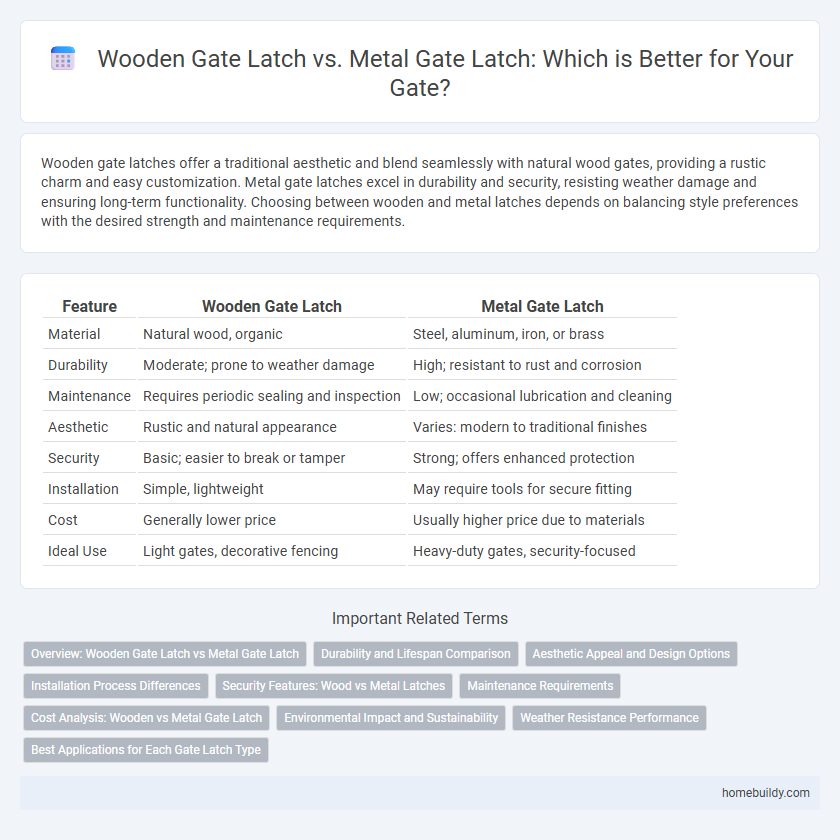Wooden gate latches offer a traditional aesthetic and blend seamlessly with natural wood gates, providing a rustic charm and easy customization. Metal gate latches excel in durability and security, resisting weather damage and ensuring long-term functionality. Choosing between wooden and metal latches depends on balancing style preferences with the desired strength and maintenance requirements.
Table of Comparison
| Feature | Wooden Gate Latch | Metal Gate Latch |
|---|---|---|
| Material | Natural wood, organic | Steel, aluminum, iron, or brass |
| Durability | Moderate; prone to weather damage | High; resistant to rust and corrosion |
| Maintenance | Requires periodic sealing and inspection | Low; occasional lubrication and cleaning |
| Aesthetic | Rustic and natural appearance | Varies: modern to traditional finishes |
| Security | Basic; easier to break or tamper | Strong; offers enhanced protection |
| Installation | Simple, lightweight | May require tools for secure fitting |
| Cost | Generally lower price | Usually higher price due to materials |
| Ideal Use | Light gates, decorative fencing | Heavy-duty gates, security-focused |
Overview: Wooden Gate Latch vs Metal Gate Latch
Wooden gate latches offer a classic, rustic aesthetic that complements natural wood gates while providing moderate durability and ease of repair. Metal gate latches, typically made from steel or iron, deliver enhanced strength, weather resistance, and security, making them ideal for heavy-duty use or harsh outdoor conditions. Choosing between wooden and metal gate latches depends on balancing aesthetic preference with functional requirements such as longevity and resistance to environmental factors.
Durability and Lifespan Comparison
Wooden gate latches offer a rustic aesthetic but generally have a shorter lifespan due to susceptibility to weathering, rot, and insect damage. Metal gate latches, especially those made from stainless steel or galvanized iron, provide superior durability, resisting corrosion and wear in harsh outdoor conditions. The increased strength and longer lifespan of metal latches make them a more reliable choice for long-term gate security.
Aesthetic Appeal and Design Options
Wooden gate latches offer a rustic and natural aesthetic that seamlessly blends with traditional garden or fence designs, providing warmth and charm through various carvings and finishes. Metal gate latches feature sleek, modern designs with options in wrought iron, brass, or stainless steel, delivering durability alongside customizable shapes and intricate detailing. Choosing between wooden and metal gate latches depends on the desired visual impact and compatibility with the overall gate style.
Installation Process Differences
Wooden gate latches typically require pre-drilling and precise alignment due to the material's density and grain, often necessitating wood screws and careful sealing to prevent weather damage. Metal gate latches involve metal-to-metal installation, requiring bolts or metal screws, and may need welding or anchor installation for robust security. The installation of metal latches generally demands more specialized tools and expertise compared to the more straightforward screw and drill process used for wooden gate latches.
Security Features: Wood vs Metal Latches
Metal gate latches offer superior security features compared to wooden latches due to their strength, resistance to forced entry, and durability against weather conditions. Wooden latches are more susceptible to damage, warping, and weakening over time, which can compromise gate security. Choosing metal latches, often made from steel or wrought iron, ensures long-lasting protection and enhanced resistance to tampering.
Maintenance Requirements
Wooden gate latches demand regular sealing or painting to prevent moisture damage and warping, ensuring durability over time. Metal gate latches, especially those made of stainless steel or galvanized iron, require minimal maintenance but benefit from occasional lubrication to avoid rust and ensure smooth operation. Choosing between them depends on the time and effort available for upkeep as well as environmental exposure.
Cost Analysis: Wooden vs Metal Gate Latch
Wooden gate latches generally incur lower upfront costs due to inexpensive materials and simpler craftsmanship, making them a budget-friendly option for basic gate security. Metal gate latches, while more costly initially, offer superior durability and resistance to weathering, potentially reducing long-term maintenance and replacement expenses. Evaluating total cost of ownership reveals that metal latches may provide better value despite higher initial investment, especially in harsh outdoor environments.
Environmental Impact and Sustainability
Wooden gate latches have a lower environmental impact due to their biodegradable nature and renewable sourcing from sustainably managed forests. Metal gate latches, usually made from steel or aluminum, have a higher carbon footprint associated with mining and manufacturing, but offer greater durability and longevity, reducing the frequency of replacements. Choosing sustainably harvested wood or recycled metal can enhance the sustainability profile of either latch type.
Weather Resistance Performance
Wooden gate latches offer limited weather resistance as they are prone to swelling, warping, and rotting when exposed to moisture and extreme temperature changes. Metal gate latches, especially those made from stainless steel or galvanized steel, provide superior weather resistance by preventing rust and corrosion even in harsh outdoor environments. Choosing a metal gate latch ensures longer durability and reliable performance in varying weather conditions compared to wooden alternatives.
Best Applications for Each Gate Latch Type
Wooden gate latches are best suited for rustic or traditional garden gates, offering a natural aesthetic and easy customization for lightweight wooden gates. Metal gate latches provide superior strength and durability, making them ideal for security gates, heavy-duty farm gates, or areas with high exposure to weather and wear. Selecting between wooden and metal gate latches depends on specific needs such as aesthetic preference, gate material, and environmental conditions.
wooden gate latch vs metal gate latch Infographic

 homebuildy.com
homebuildy.com